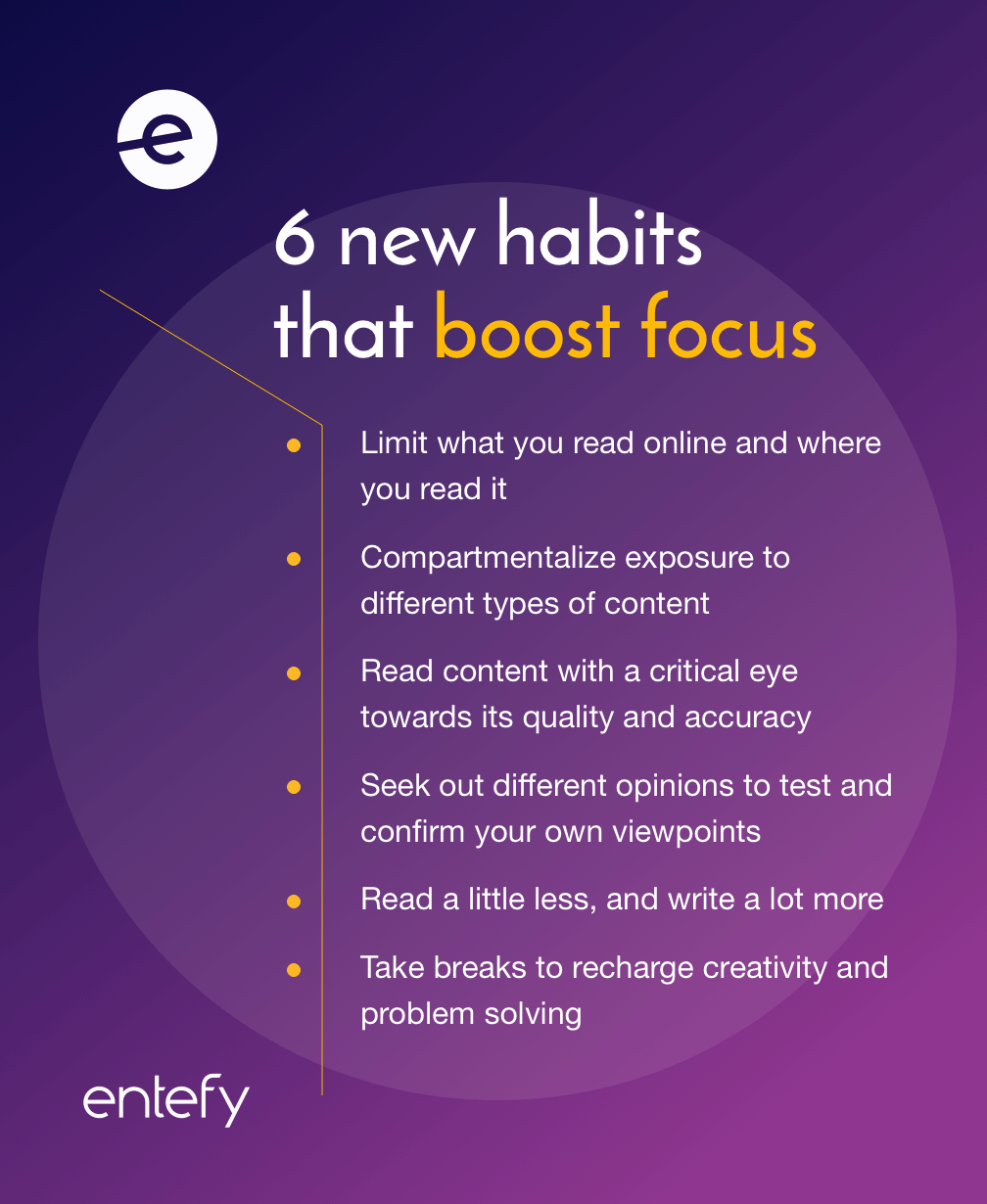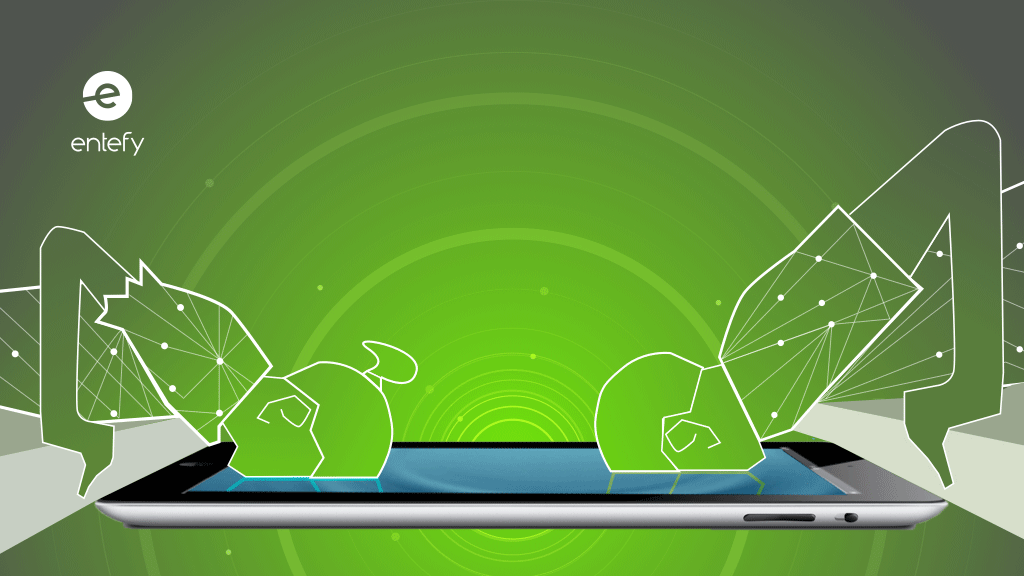The wheel. The printing press. The telegraph. These technological advances certainly changed things for humans. And today smartphones are no exception. Science is beginning to show that they’re not just changing things, they’re changing us. Some of these changes are unexpected and certainly worth knowing about.
Entefy recently shared a roundup of research into the ways new technology is impacting our physical health. Now there is evidence accumulating that digital devices have a strong effect on our behavior and mental health as well.
In the digital era, that old piece of wisdom “everything in moderation” seems particularly valid. Look at it as finding your own personal Goldilocks formula for screen time.
Here are 12 ways digital device use can impact our brains, behavior, and mental health:
1. Technology heightens our desire for instant gratification
If you click on a video and it’s slow to play, how long are you willing to wait? One study into how video quality impacts viewers provides an answer that’s pretty telling. The study included 6.7 million unique viewers who watched 23 million videos for 216 million minutes. The finding was that viewers start clicking elsewhere after just 2 seconds, and every additional second of delay added another 5.8% to the abandonment rate. These findings are specific to online video behavior, but certainly point to a lot of people expecting instant (digital) gratification.
2. Social media can fuel narcissism
A group of 292 individuals (75% were college students) participated in a study into potential links between Facebook use and high scores on the narcissistic personality inventory (NPI) survey. It found that Facebook users with high NPI scores tended to have more friends on Facebook, tag themselves more often, and update their profile photos and newsfeeds more. “For the average narcissist, Facebook ‘offers a gateway for hundreds of shallow relationships and emotionally detached communication,’” said Christopher Carpenter, the study’s author. “In general, the ‘dark side’ of Facebook requires more research in order to better understand Facebook’s socially beneficial and harmful aspects.”
3. Social media impacts the mental health of young people
The images we see on social media are carefully curated and not always the best reflections of the everyday world. Compare your next home cooked meal to the food porn on Instagram and you’ll know the feeling.
This “unreality” can have a big impact on younger users. The #StatusofMind study in the UK surveyed 1,500 participants aged 14 to 24 about their social media use. It found that social media platforms did in fact negatively impact health in areas like anxiety, depression, and body image. Further, 7 in 10 participants reported experiencing cyberbullying.
But other findings were more positive: Social media can improve access to information about other people’s experiences with health issues, and social media users report more emotional support from their contacts.
4. Trouble when your smartphone is something you “can’t live without”
One idea about smartphones seems to be taking hold: Smartphones are the new cigarettes. Like smoking in, say, the 1950’s, smartphones are a habit that few people really question. But unlike cigarettes, the verdict is still out on exactly how much smartphone usage leads to negative health effects.
One consideration is whether constant connectedness makes it easier to dedicate time and attention to things that don’t really matter. One psychiatrist observed that many people in her practice have “disconnected from what really matters, from what makes us feel nourished and grounded as human beings.”
5. Technology appears to be warping millennials’ brains
There are 83.1 million people aged 18 to 34 in the U.S. spending an average of 18 hours per day using digital media. If that seems high, the study counts 1 hour multitasking on social media and streaming video as 2 total hours of media use. Being constantly “on,” digitally speaking, may be changing how the brain develops. Preliminary findings of research into brain development among millennials suggest that their brains are developing differently because of their almost constant interaction with digital apps and devices. These differences can be seen in brain regions linked to communication skills and the core of a person’s personality.
6. Digital overload impairs our natural ability to filter stimuli
Our brains simply weren’t designed to handle the flood of information that constantly bombards us online. The brain works best when it can efficiently filter the noise from the signal, and a big way to help it do that is to limit how much informational stimulus we’re exposed to.
7. Social media and online news can inhibit memory formation
There is another noteworthy aspect of brain behavior related to social media use: memory formation. Research suggests that low levels of focus (as is typical while browsing social feeds and online news sites) can inhibit memory formation. You may have experienced this when you tried and failed to recall something that you saw on your feeds earlier in the day. The takeaway is that if you want to remember something, be prepared to give it sustained attention, and then revisit it again and again to make it stick.
8. Smartphone use can cause headaches and nerve damage
First, a quick anatomy lesson. The occipital nerves run out from the spine into the back of the neck and continue running to the top of the head. Problems with the occipital nerves include tension headaches and back pain. There is evidence that prolonged smartphone use can stress the occipital nerves, eventually leading to a condition called occipital neuralgia. Occipital neuralgia is characterized by chronic pain and headaches, especially those localized to the side of the head and scalp.
9. Talk about stress
The American Psychological Association polled 3,500 adults about their smartphone use in an online questionnaire. The survey found that “people who are always looking at their digital devices—called ‘constant checkers’—reported higher levels of stress compared to people who spend less time interacting with their gadgets.” The report used a scoring metric to quantify stress levels: “On a 10-point scale, where 1 is ‘little or no stress’ and 10 is ‘a great deal of stress,’ the average reported overall stress level of constant checkers is 5.3. For non-constant checkers, the average reported stress level is 4.4.” Suggesting that too much smartphone checking leads to a 20% boost in stress levels.
10. Screen time before bed impacts sleep worse than a double espresso
University researchers conducted a sleep study that compared the impact to the circadian clock from bedtime caffeine consumption and digital device screen time. The results suggested that, “consumption of a caffeine dose equivalent to that in a double espresso 3 hours before habitual bedtime induced a ~40-min phase delay of the circadian melatonin rhythm in humans. This magnitude of delay was nearly half of the magnitude of…exposure to 3 hours of evening bright light” from a digital device. We’ve previously covered better sleep from a notification vacation.
11. Digital connectedness can lead to real world isolation
A Massachusetts Institute of Technology researcher conducted a metaanalysis (a study of multiple studies) of psychiatric research into social media use and isolation. She found that, “people who choose to devote large portions of their time to connecting online are more isolated than ever in their non-virtual lives, leading to emotional disconnection, mental fatigue, and anxiety.”
12. Mobile device use associated with an increased risk of brain cancer
The tin hat crowd may be onto something. A study into the potential link between brain tumors and mobile phone use found that there is indeed an increased risk associated with prolonged mobile and cordless phone use. The World Health Organization is more cautious, calling the electromagnetic fields produced by mobile devices “possibly carcinogenic.”
What’s important to keep in mind is that much of the research focuses on what happens when people over-use devices. So, like with many things in life, the answer to “What can I do about it?” is to practice moderation. Understand what the science tells us can happen, and modify your own habits accordingly.
Here are 6 ways to boost your focus and retain more of what you read:

